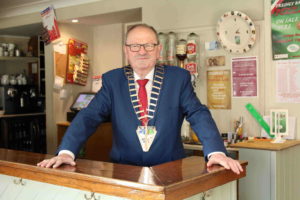“It’s what I would expect of my President”
“It’s the main talking-point in towns and villages everywhere.”
Padraic McGann, President of the Vintners Federation of Ireland, has little doubt about the deleterious effect of the new drink-drive legislation on consumers across the country.
“It has really crippled the trade nationally” he says, “but in rural Ireland, it’s the topic of conversation in every house at the moment as people just don’t know where they stand on the drink-drive limits – can they have a drink at all?” he hears them wonder even though the limits remain unchanged – it’s the penalty that’s increased.
Something has to be done – and so the Federation intends clarifying the scaremongering.
“We’re now at the end of January and it’s still the same; so we’re getting out information to educate people about when it’s safe to drive the ‘morning after’,” he says.
But there’s no village or crossroads in the country where the Gardai haven’t been present on a regular basis, he claims.
“It’s so important that we get this information to people so that they understand that they can have a few pints in the evening and not worry about the next morning. Our present poster in members’ pubs is the most-read poster addressing the misconception that the limits have changed.”
Indeed drink-driving is probably the biggest issue for rural pubs at the moment.
“Our customer has changed dramatically,” he explains, “The way we live is completely different because of the drink-driving legislation. As a result, a lot of people don’t go out at all and people don’t realise this unless you’re driving through rural areas. Socialising in the pubs is fading out in rural areas.”
Now, more than at any other time therefore, the rural publican needs tax breaks and other incentives to stay open.
This campaign to bring clarity to the drink-drive discussion began in the middle of February.
So how does Padraic view Minister Shane Ross’s comments on the high price of non-alcoholic beers in pubs?
“As publicans we buy from suppliers and pay VAT,” he replies, “The perception – like in many things – is that the publican has the power to reduce the price on this, but the publican is just at the end of the chain so that by the time the product reaches the publican from the wholesaler there’s no mechanism for publicans to reduce the price. However scope does exist back at the producer level,” he claims.
“It’s not as simple as the publican reducing the price of non-alcoholic beers. There’s a whole production process to be taken into account so it’s a bit simplistic for Ross to say it’s a scandal. It’s more complicated than that.”
‘Ruxi’
And the Federation goes big on backing ‘Ruxi’ – Jim Daly’s ‘Uber’-style taxi.
“It could be our saviour,” believes Padraic, “We’re looking at this as a way of alleviating the problem where publicans could purchase a seven-seater and transport their customers home.
“Could changes be made to VRT for the Budget?” he wonders, “Perhaps with a change in the social climate we might be given more of a hearing because if such a tax break was there, many publicans might avail of it to increase their business.
“Publicans are trying to make a decision as to whether they should stay in business or not, so we’re looking at various different ideas for expansion before they close their doors finally. There’s always a new idea just around the corner – hopefully!”
Presidential footfalls
Padraig comes to the Presidency from a different background to Pat Crotty, the previous President.
“Pat has a premises in Kilkenny, a fine city; customers come in his door due to his being in a high footfall area where I’m from a small village with four pubs and 1,800 people.
“There’s a big difference in perspective here. A couple of funerals a month make a difference to my trade.”
With no passing trade or tourism publicans like Padraic have to think outside the box.
“Pubs must be more events-driven,” he believes.
“We’re fighting for business day-to-day,” he says, “We depend on events – if we got one event a week we could survive,” he believes.
He had a nightclub once which did good business; he also had a restaurant and hosted weddings.
“We opened at the weekends and it went well but when the recession hit, it killed off this business as well as the nightclub business,” he remembers.
Of course businesses such as his are also subject to pressures of a different kind in the form of sky-high insurance rates.
Insurance progress
With increasing insurance premia putting increasing pressure on the licensed trade, some late night venues – even in city centre locations – decided that it’s not worth the candle and have closed. So how wide of the mark is it to expect that rural pubs operating on a full-time basis (as well as those only operating reduced hours) will follow suit if something’s not done soon (and another rural service is lost forever)?
Indeed this is why the Alliance for Insurance Reform was set up – and it’s beginning to get results.
“It’s not a recent problem,” explains Padraic, “But the recent passing of Section 28 is a step forward. Now judges will have no discretion in considering the 30-day time limit for submitting claims.”
He describes this as “a great breakthrough, one of the first in insurance in all the years I’ve been around.
“There will be more to follow from Peter Boland and his colleagues in the Alliance For Insurance Reform. It’s the first of its 10 ‘asks’ but we still have nine to go. However this is the first tangible sign in over a year since the Alliance was formed.”
Minimum Unit Pricing & the pub
The passing of MUP legislation will undoubtedly help close some of the gap between off-trade prices in the multiples and on-trade prices. But can Padraic see any other advantages in light of the fact that it will also make alcohol more attractive across the border in the short-term?
“That’s going to happen,” he responds, “There are going to be some who’ll benefit and others who won’t. But in regard to alcohol’s cost on the health service, it will reduce costs.
“The Late Night economy cannot survive this type of at-home drinking and neither will pubs.”
And just how will Section 23 of the Public Health (Alcohol) Act – which bans volume discounts (for example, “buy six bottles of wine and get the seventh free”) – affect the on-trade rather than just the off-trade?
“It bans volume sales at reduced rates so people will be less inclined to ‘load up’ before going out for the evening,” he responds.
Alcohol Bill
Then there’s the possibility of pubs having to put up health warning notices under the new Alcohol Bill.
“The draft regulations relating to labelling are currently under EU review,” points out Padraic, “Once that hurdle is cleared there’s a three-year implementation period, so we’re looking at 2022 at the earliest before they come into effect. In the meantime, we await the publication of the Department of Health draft regulations and will then consider the implications for publicans.”
Of course the Federation doesn’t have all the answers.
“All we can do is present our members with a range of options and arm them with information going forward.
“At the end of the day every publican has to make a decision about his or her own business.”
Now approaching the mid-point of his Presidency, at the end of his term he’d hope to be able to say that he’d been responsible for one or two advances, “… something tangible like an insurance solution for our members,” he says, “That would be a real game-changer”.
He’s constantly on the road meeting members – which is itself a huge commitment – and hearing their concerns, taking them onboard.
His rational for this is refreshingly straightforward: “I’m happy to meet people and help them sort their problem to my utmost because it’s what I would expect of my President.”

“A couple of funerals a month make a difference to my trade.”








